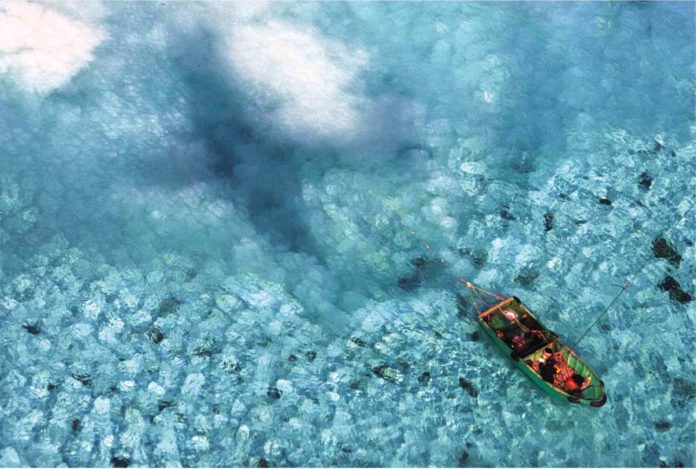TENSIONS are still high as the issue on the highly-disputed territories of the West Philippine Sea are still under debate. With the Philippines having recently won the ruling of the Arbitral Tribunal over jurisdiction on the territories, just how are Filipinos going to protect the resources present in them?
According to the Department of Environment and Natural Resources (DENR), China has been the country with the most number of claims in lands in the West Philippine Sea.
China’s primary argument is its “time-honored” claim under the Nine Dash Line. The map also “supports” its other claims over territories in the West Philippine Sea such as, the Spratly Islands, the Macclesfield Island and the Scarborough Shoal.
Unfortunately, the reclamation activities done on the aforementioned islands were said to have caused severe damage to their marine environment.
‘Environmentally unfriendly’ reclamation
Various reports say China was planning to turn areas of the territories into artificial islands and military bases similar to the seven artificial islands constructed by Chinese engineers in the Spratly.
Aida Beniza, assistant protected area superintendent of the DENR for Rizal, said this is not recommended as these are areas susceptible to environmental degradation.
Beniza referenced reports from the Asia Maritime Transparency Initiative’s (AMTI) and its exclusive photos that showed current developments on the Mischief reef, the Fiery Cross Reef, the Johnson South Reef, the Cuarteron Reef, the Hughes Reef all in the Spratly Islands.
“If China builds a runway in the area, these expansions would be a certain threat to biodiversity,” she said.
A case study from Malaysian researcher Chai Kian Hoon said that actions such as land reclamation, dredging and conversion of land can cause major problems to the coastal ecosystem and environment. These actions are often related to industrial and housing purposes, aquaculture and agriculture activities, tourist resorts and sand mining.
“Considering that China causes significant damage to the area’s biodiversity, we can’t entirely deny that they also provided means to expand and make progress. However their ways are not environmentally oriented,” Engr. Marilyn Paceril, a planning officer from DENR, said.
The AMTI added that China’s activities have already caused irreversible environmental impacts to the surrounding area.
“Hundreds of millions of tons of sand and coral have been dredged from the seabed and dumped atop fragile coral reefs that are vital components of the maritime ecology. Marine experts expect that the work has already caused disastrous and essentially irreversible environmental impacts,” AMTI said on its website.
Philippines “ready” for conservation tasks
An article from Scientific American indicated the Philippines had “environmental claim” over the islands “because it has had the most success and experience with maintaining marine ecosystems.” The Tribunal has also called Chinese authorities responsible for the loss of endangered species at the disputed islands after permitting unsustainable fishing practices.
It added that the Philippine government is “highly experienced in dealing with marine ecosystems and management” and its Marine Protected Area (MPA) has shown progress in conservation.
However, officials from the DENR clarified that the agency will only be able to actively participate in conservation activities once the islands become accessible to Filipinos.
Rizal’s provincial environment and natural resources officer Isidro Mercado explained that the DENR’s roles to the islands will extend only to the protection, management, development and conservation of the remaining sources in the area.
“There are existing projects that can be use[d] to manage the coastal areas found in the West Philippine Sea. [We also have] coastal and marine resource management projects for coral reefs,” he said. “[However,] China’s building efforts are beyond our jurisdiction.”
A five year project by DENR was launched last May called, “Strengthening the Marine Protected Areas to Conserve Marine Key Biodiversity Areas,” with the goal to boost ongoing efforts in protecting the richest coastal and marine biodiversities found in the country.
The project is consistent with policies on biodiversity conservation and gives contribution on achieving the goals and targets on MPAs, and on adapting to climate change and the ecosystem approach to fisheries management.
DENR has already stressed the need to focus on conservation efforts to adapt to climate change and protect the country’s marine ecosystems against threats, which could reach P3-billion to P5-billion annually.
The agency has already been earmarked with a P500-million fund from the 2016 National Budget .
Its coastal and marine division is focused on implementing a coastal and marine “environment management framework” that would provide guidelines for reviewing standards and policies, as well as to monitor the compliance of DENR to international commutments and local development plans.
Politics amid ecology
The Arbitral Tribunal has considered the Nine-Dash-Line map inadmissible since “there was no legal basis for China to claim historic rights to resources within the sea areas” falling within the map.
Thus, the Arbitral Tribunal has concluded in a meeting last July 12 that China’s “land reclamation” was a clear violation to the Philippines’ sovereign rights. It added the Mischief Reef and the Second Thomas Shoal were part of the country’s Exclusive Economic Zone (EEZ) as prescribed by the United Nations Convention on the Law of the Sea.
The EEZ is one of the main provisions of the 1994 treaty, and is the maritime area over which a state has the right to exploit all of its natural resources. Coastal states have the right to limit the access of foreign nations to these areas.
Senior Associate Justice Antonio Carpio, in a previous Varsitarian article, said that China has also violated the Declaration on the Conduct of Parties in the West Philippine Sea signed between China and Southeast Asian countries in 2002.
This document states that all parties should exercise “self-restraint in the conduct of activities that would complicate or escalate disputes and affect peace and stability.”














